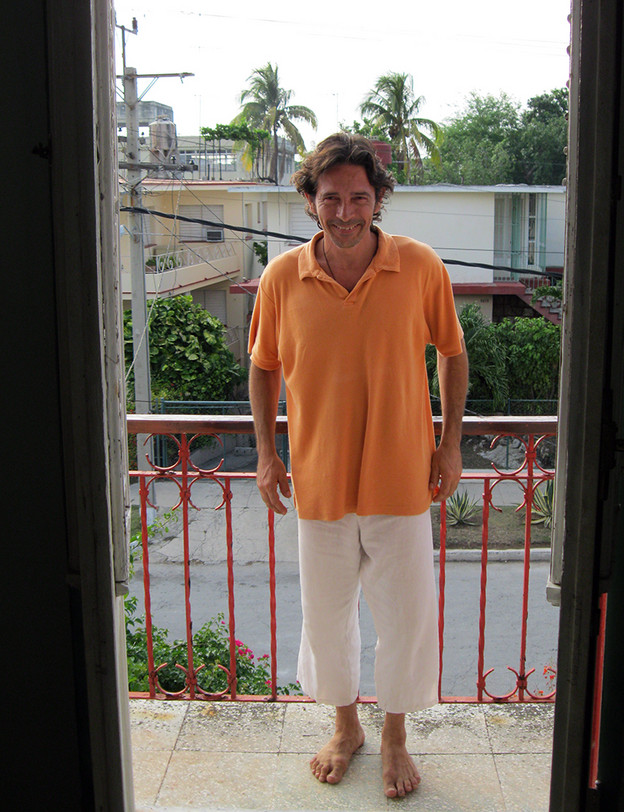Xeno / with audio

Xeno-, OED: “before a vowel xen-, repr. Greek ξενο-, ξεν-, combining form of ξένος a guest, stranger, foreigner, adj. foreign, strange”[i]
In his 2009 book Lingua Franca Omar Pérez inhabits estrangement, creating a zone of intermingled languages and hybrid cultures. The poems offer some combinations that would be unsurprising to readers aware of Cuba’s famously “transculturated” history . . . alongside far less common juxtapositions, which emerged out of his temporary residence in Europe at the beginning of the twenty-first century.
NEDERLANDS GEDICHT [my English translation, retaining Pérez's Dutch]
twijfelen, niet twijfelen,
alleen twijfelen
niet alleen twijfelen, maar twijfelen ook.
O Nederlands zonder accent
O accent zonder Nederlands
Dutch poem
to wonder, not to wonder,
just to wonder
not just to wonder but also, you wonder.
Oh Dutchman without an accent.
Oh accent without a Dutchman.
NEDERLANDS GEDICHT [original Dutch/Spanish poem from Lingua Franca (Havana: Ediciones UNIÓN, 2009)]
twijfelen, niet twijfelen,
alleen twijfelen
niet alleen twijfelen, maar twijfelen ook.
O Nederlands zonder accent
O accent zonder Nederlands
poema holandés
dudar, no dudar,
sólo dudar
no sólo dudar sino también dudar.
Oh holandés sin acento.
Oh acento sin holandés.
Pérez has experimented elsewhere with the composition of poems in English. Despite the chunk of Dutch in the poem above, and some complete titles in English below (ex. "My jail is blue"), Lingua Franca remains Spanish-dominant, if stretching that category considerably at times.
This is poetry created by someone with an extended interest in literary translation. However, to see the poems primarily as language games for the page would be to overlook their grounding in the lived experience of migration, a phenomenon that can include prolonged and serial testing of new places as potential homes.
Poems address the author’s short- and long-term immersions in Dutch, English, and Greek, as well as his workplace usage of French, Italian and more in an office job in Amsterdam. They also give a sense of how Pérez, upon returning to Havana, would take up uber-Cuban cultural imagery with his own kind of difference (see for example Martí.doc and Nfumbe.doc ).
Perhaps the best way to develop a gut feeling for how and why Pérez threw down these combinations is to read them against excerpts from his unpublished journal from his European years, entitled “Cubanology.” And in that very comparison is a challenge to the -ology of Cubanness, a whack to academic frames that can be at once useful and tone-deaf. Perhaps useful to paraphrase Rimbaud: Cuba is someone else.
Excerpt: “Athens and Greece”: see Mandorla 15 (2012)
Excerpt: “Holland,” touching on language classes and his job at Bookings
Excerpt: On returning to Cuba, in Asymptote
Recordings: Omar Pérez reads 14 poems from Lingua Franca
Audio recorded in Havana, Cuba, at the studio of Dennis Casteleiro
Los sabores, los nombres
Perez-Omar_1_Sabores_Havana_2009
Jerigonza
Perez-Omar_2_Jerigonza_Havana_2009
Nederlands gedicht
Perez-Omar_3_Nederlands_Havana_2009
Documento Martí (Martí.doc)
Perez-Omar_4_Marti_Havana_2009
Documento Nfumbe (Nfumbe.doc)
Perez-Omar_5_Nfumbe _Havana_2009
Death of a human being
Perez-Omar_6_Death_Havana_2009
Bookings, NL
Perez-Omar_7_Bookings_Havana_2009
Germanía
Perez-Omar_8_Germania_Havana_2009
*English translations of the following poems appeared in Jacket 35 (Early 2008): http://jacketmagazine.com/35/perez-lingua-franca.shtml
Actos de un raro dandismo
Perez-Omar_9_Actos_Havana_2009
Todo se vuelve agua
Perez-Omar_10_Todo_Havana_2009
El canto como arte marcial
Perez-Omar_11_Canto_Havana_2009
Manos piadosas
Perez-Omar_12_Manos_Havana_2009
Compré ojos
Perez-Omar_13_Compre_Havana_2009
My jail is blue
Perez-Omar_14_My-jail_Havana_2009
[i] "xeno-, comb. form." OED Online. Oxford University Press, September 2015. Web. 11 November 2015.
Intermedium